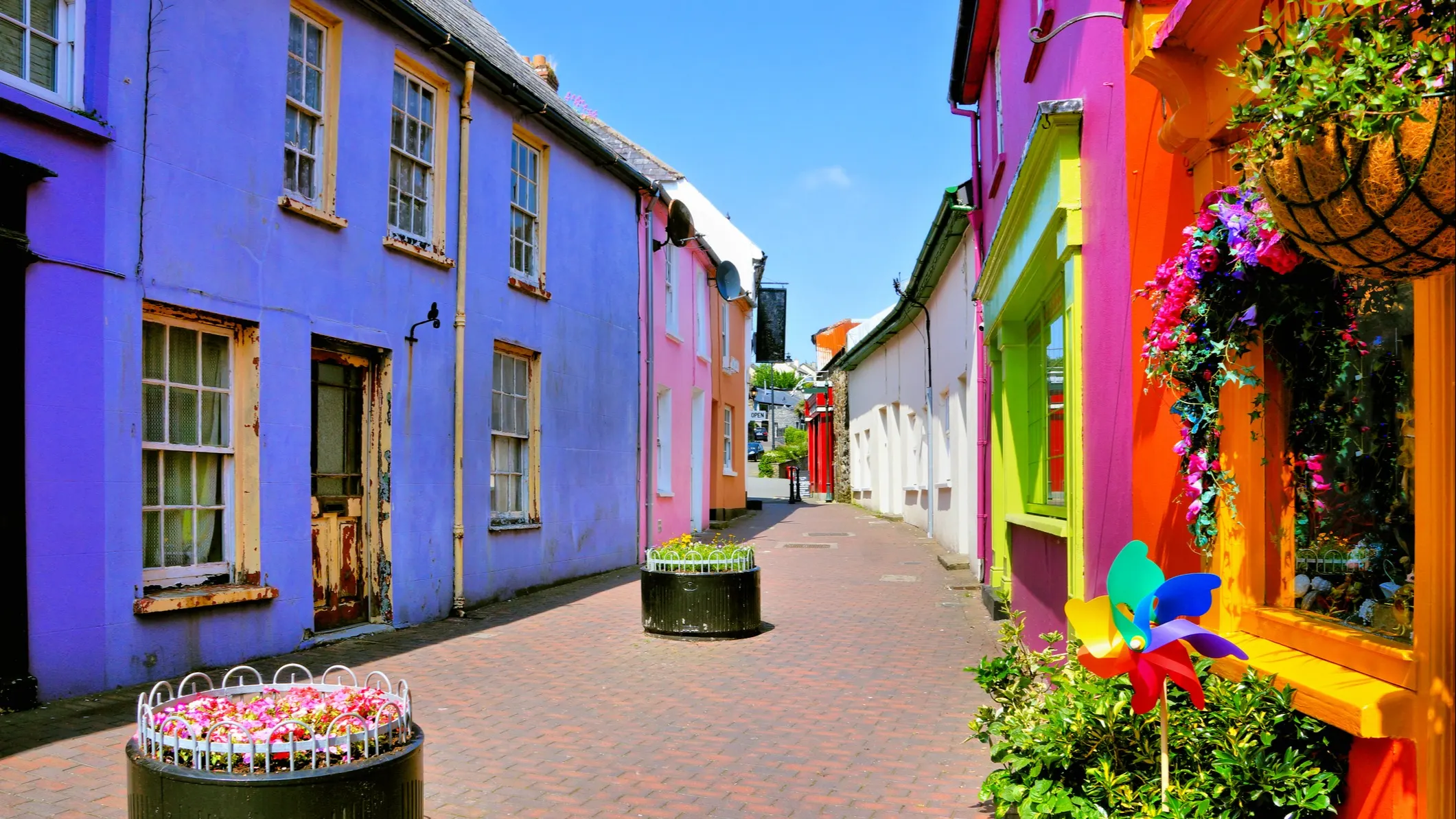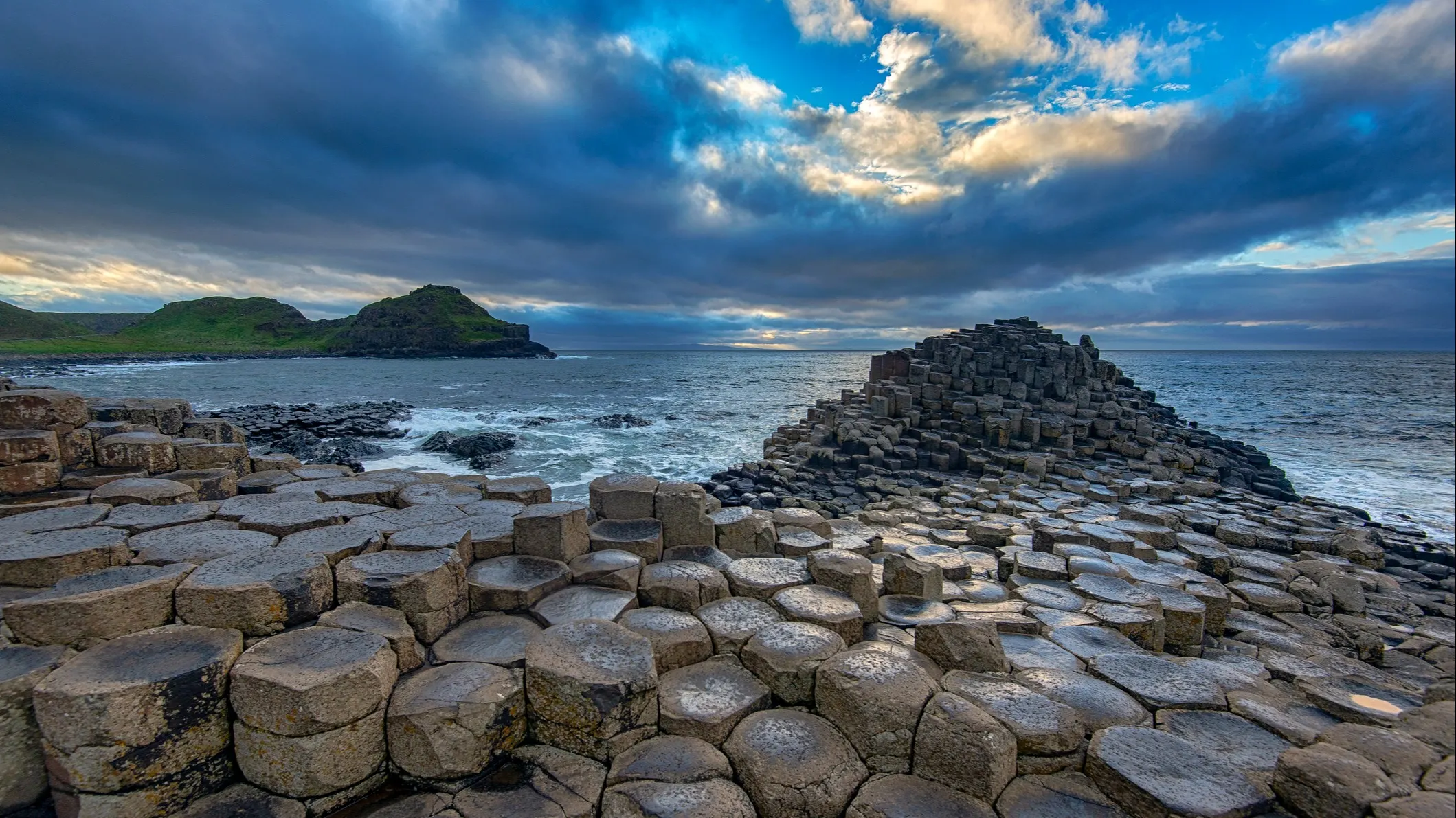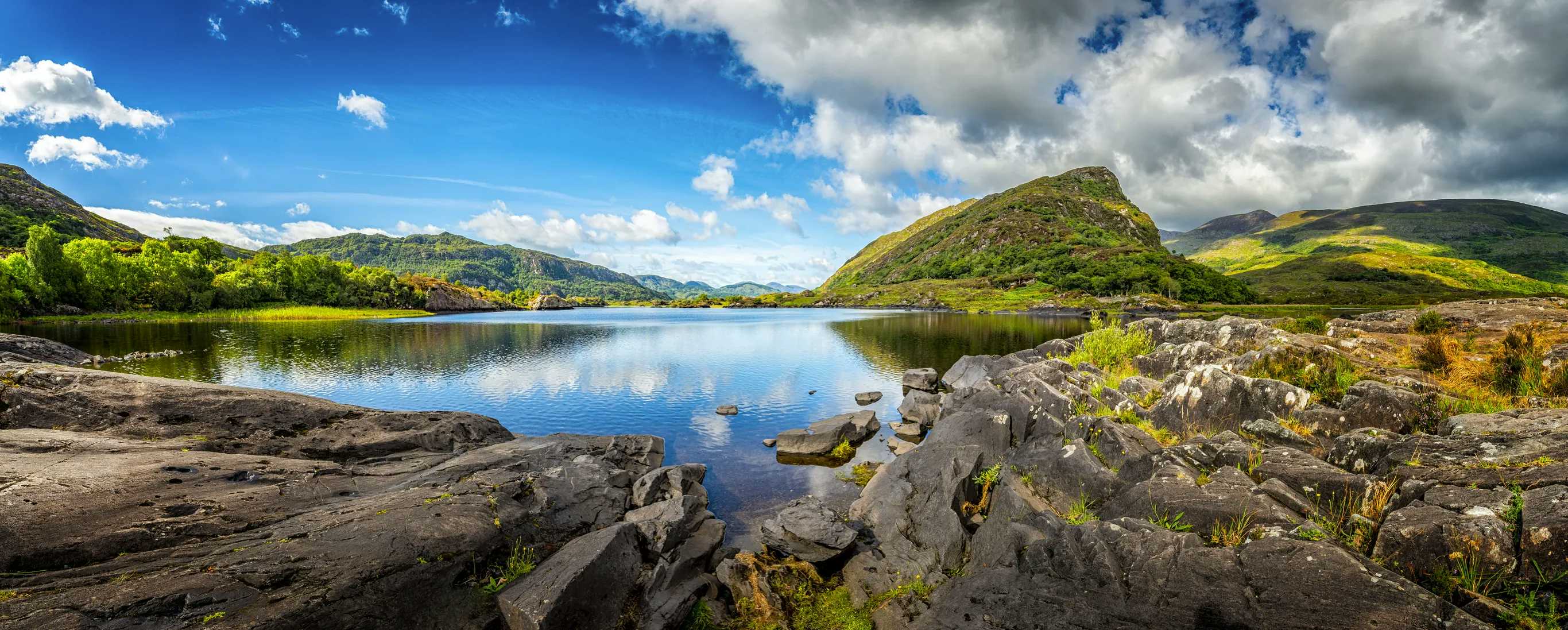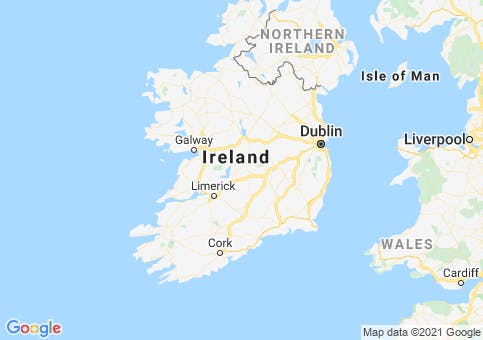Ireland is just like you have probably imagined. It really does come with a storybook landscape of castles, sheer cliffs, and swans gliding across looking-glass lakes. There are old-fashioned horse fairs, cozy pubs where fiddle music rings out into the night, and seaside towns with houses painted all shades of the paint-box.
Green fields are hemmed with little stone walls. Cheery farmers wave at you from tractors. Narrow lanes are the haunt of stray sheep, stray cows, and the occasional stray donkey. And you are never too far away from a beach, a fishing spot, a golf course, or a literary gathering.
Your chance to retire overseas now
Your chance to retire overseas now
Learn more about Ireland and other destinations by signing up to our daily IL Postcards e-letter and we'll immediately send you a free report: 20 Countries Compared, Contrasted, Ranked, and Rated.
You don’t have to be rich to enjoy a pampered retirement, you just need to know where to go.
With our 34th Annual Global Retirement Index, our experts hand you a detailed roadmap. Details and a Special Offer Here!

By submitting your email address, you will receive a free subscription to IL Postcards, The Untourist Daily and special offers from International Living and our affiliates. You can unsubscribe at any time, and we encourage you to read more about our Privacy Policy.
Today, lambs are gamboling in my neighbor’s meadow, primroses bloom in the hedgerows and robins and chaffinches are busy nest-building. It’s gorgeous…the kind of spring day that begs you to pull on your boots and go for a hike.
One of the joys of living in Ireland is the changing seasons. Thanks to the Gulf Stream, it rarely gets bitterly cold. Even in winter, you can be out and about. Sure, there’s a rain shower now and again—but without them you would never see a rainbow.
Where to Live in Ireland
The difficult thing will be deciding where to settle. From the heathery mountains of Donegal down to the witchy-fingered peninsulas of Kerry, the entire western seaboard delivers a bonanza of scenic splendors. Connemara, the Aran Islands, Galway City, the Cliffs of Moher, and the Ring of Kerry are all rightly on the tourist trail, but not so many visitors explore the historic seaside town of Westport or the myriad islands of Clew Bay in County Mayo. (There are supposedly 365 little islands—one for every day of the year.) Nor do many follow in the footsteps of the poet W.B. Yeats who was entranced by the legendary landscapes of county Sligo.
On the south coast, Cork is Ireland’s largest county. Along with the cultural delights of Cork City, its charms include the harbor town of Kinsale, noted for its gourmet restaurants and foodie weekends, color-washed Clonakilty with its hand-painted shop-fronts, and historic Youghal—and we do mean historic. Sir Walter Raleigh was its mayor back in 1588.

In the “sunny southeast,” the old Viking settlements of Waterford and Wexford are small cities with magnificent beaches on the doorstep. (If you enjoy opera, Wexford has an opera festival every October.) A short distance inland, Kilkenny is Ireland’s best-preserved medieval city, and the surrounding countryside is absolutely peppered with the timeworn ruins of abbeys and monasteries.
On the east coast, you’ll find the Wicklow Mountains, neolithic Newgrange, and of course Dublin, Ireland’s vibrant capital. But don’t neglect to explore Ireland’s inland counties too. It’s not “a long way to Tipperary” at all—nor to counties Westmeath, Offaly, or Roscommon. Many of the country’s best fishing loughs (lakes) are in the midlands, and the riverbank towns of the Shannon often have a history going back to the days of Saints and Scholars.
Ireland has so many wonderful locations, but the great thing about living here is that it’s a fairly compact island. So whether it’s for a day trip or a weekend break, you’ll never be too far away to go and explore them all.
10 Best Things to Do in Ireland
By Charlotte Cuddihy

Over 80 percent of Ireland’s visitors come for the scenery alone, and I can’t say I blame them! From the blustery coastlines of the Wild Atlantic Way to the calm, serene peaks of the Midlands, each landscape is filled with legends, tales, and folklore dating back to Viking and Celtic times.
It’s always a good time to visit Ireland, especially if your visit involves a road trip around the Emerald Isle. Everywhere you go there’s widespread beauty and magic. If you’re looking to experience some of Ireland’s most magnificent sites, then here are some of the best we have to offer.
1. Cliffs of Moher
Positioned on Ireland’s renowned ‘Wild Atlantic Way’, the Cliffs of Moher boast some of the most awe-inspiring backdrops in Ireland. The spectacular sea cliffs are found southwest of the Burren region in County Clare. The cliffs run for an incredible 8.5 miles and ascend over 700 feet. It’s no wonder the Cliffs have become one of Ireland’s most visited tourist attractions. The Cliffs may already seem familiar having appeared in films such as Harry Potter and the Half-Blood Prince and Leap Year.
There are so many ways to experience the cliffs, with multiple access points available. The Cliffs of Moher Coastal Walk is an 11-mile trail where you can experience the entire landscape. The trail starts in Doolin and traces the Cliffs to Hags Head.
Your chance to retire overseas now
Your chance to retire overseas now
Learn more about Ireland and other destinations by signing up to our daily IL Postcards e-letter and we'll immediately send you a free report: 20 Countries Compared, Contrasted, Ranked, and Rated.
You don’t have to be rich to enjoy a pampered retirement, you just need to know where to go.
With our 34th Annual Global Retirement Index, our experts hand you a detailed roadmap. Details and a Special Offer Here!

By submitting your email address, you will receive a free subscription to IL Postcards, The Untourist Daily and special offers from International Living and our affiliates. You can unsubscribe at any time, and we encourage you to read more about our Privacy Policy.
2. The Burren
After visiting the Cliffs of Moher, why not take a trip to Clare’s other major attraction, the Burren? The Burren National Park is one of Ireland’s most famous national parks. Covering roughly 140 square miles, it is filled with limestone pavement, lakes, turloughs, cliffs, and woodlands. The name itself originates from the Irish Boíreann which literally means a rocky place. If you’ve visited the Burren, you’ll understand just how fitting this is. What makes the Burren so unique is its ability to produce so much wildlife, leading to its nickname as ‘the fertile rock’.
A single trip to the Burren will have visitors awe-struck by the diverse colors from all the vegetation in one distinct biome. Not only is it remarkable the existence of dissimilar plants growing side-by-side, but they seem to thrive on land nearly entirely comprised of rock. This rare habitat is certainly worth a visit if you’re making a trip to Ireland.
3. Áran Islands
Known as ‘the Island of Saints and Scholars’, the Áran Islands can be found just off the coasts of County Galway or Doolin in County Clare.
If you’re looking for a truly authentic Irish experience, then look no further than these three islands, Inis Mór, Inis Meáin, and Inis Thiar. Inis Mór is the largest and most popular of the islands to visit.
The Irish language is predominant on the islands, along with Irish traditional music (céoil) and art. The three islands are celebrated for their wild landscapes and ‘old Irish’ way of life. Farming and fishing are the prevalent lifestyles here.
Your chance to retire overseas now
Your chance to retire overseas now
Learn more about Ireland and other destinations by signing up to our daily IL Postcards e-letter and we'll immediately send you a free report: 20 Countries Compared, Contrasted, Ranked, and Rated.
You don’t have to be rich to enjoy a pampered retirement, you just need to know where to go.
With our 34th Annual Global Retirement Index, our experts hand you a detailed roadmap. Details and a Special Offer Here!

By submitting your email address, you will receive a free subscription to IL Postcards, The Untourist Daily and special offers from International Living and our affiliates. You can unsubscribe at any time, and we encourage you to read more about our Privacy Policy.
4. Glendalough
Glendalough Valley is another one of Ireland’s most visited landscapes and is celebrated as one of its most scenic tourist spots. Glendalough is a marvelous glacial valley situated in the Wicklow Mountains. The name comes from the Irish Gleann Dá Loch, meaning Valley of Two Lakes.
Glendalough Valley is full of walking trails. If you’re not the most active, there are nine marked trails to choose from, all varying in distance. Trails start from a short half-hour hill walk and progress to the more difficult four-hour hike. Regardless of the route you choose you will not regret it, the views make the walk worth it.
Glendalough is also rich in history and culture with monuments open year-round at all times of the day. You can experience monastic sites from churches to round towers all free of charge. The only charge you may incur is a €4 (4.75 USD) fee for parking if you choose to park at the Upper Lake.
5. The Quiet Man, Connemara
Connemara is famed for its beauty, however, it’s the Quiet Man that initially fueled the tourism industry in Ireland’s Wild West as the setting for the 1950s film The Quiet Man.
The iconic film starring John Wayne and Maureen O’Hara boosted the tourism industry in Ireland. The Quiet Man Bridge at Leam is the main place tourists come to take pictures.
Your chance to retire overseas now
Your chance to retire overseas now
Learn more about Ireland and other destinations by signing up to our daily IL Postcards e-letter and we'll immediately send you a free report: 20 Countries Compared, Contrasted, Ranked, and Rated.
You don’t have to be rich to enjoy a pampered retirement, you just need to know where to go.
With our 34th Annual Global Retirement Index, our experts hand you a detailed roadmap. Details and a Special Offer Here!

By submitting your email address, you will receive a free subscription to IL Postcards, The Untourist Daily and special offers from International Living and our affiliates. You can unsubscribe at any time, and we encourage you to read more about our Privacy Policy.
6. The Lakes of Killarney and Gap of Dunloe
Killarney is home to some of the most stunning lakes in Ireland. The three main lakes in Killarney can all be found within Killarney National Park. The nearest to Killarney town is Lough Leane. This is the largest of the lakes at about seven square miles.
Muckross Lake, also known as the Middle Lake, is separated from Lough Leane by a stone arched bridge, Brickeen Bridge. Muckross Lake is the deepest of the lakes reaching depths of 246 feet. Lastly, the Upper Lake is the smallest of the three and is separated from the other two by a 2.5-mile winding waterway.
The Gap of Dunloe is another famous landscape in Ireland, located on the Ring of Kerry in Killarney. The Gap of Dunloe can be found in the MacGuillicuddy Reeks mountain range. The name comes from the River Loe which tides through the gap. Beginning at Kate Kearney’s Cottage, you’ll find the Wishing Bridge; legend has it wishes here are guaranteed to come true!
The Gap itself is 6.8 miles in length, and for this reason, some visitors choose to cycle. Other options for exploring the Gap include a guided tour. The experience includes a two-hour hike, a boat tour, and even a horse-drawn wagon journey if requested.
7. The Rock of Cashel
The Rock of Cashel, also known as St. Patrick’s Rock, is an iconic site famed for its archaeological foundation. Old Irish tales suggest that the rock originated in the Devil’s Bit mountain range 20 miles away. The legend suggests that the rock was moved to Cashel following St. Patrick’s banishing of the Devil.
The Rock of Cashel consists of a collection of medieval religious buildings. For much of ancient history, the rock was also a royal site, home to the Kings of Munster. The site still has buildings with a gothic charm, from turrets and round towers to chapels and cathedrals. It will be like taking a step back in time to the Early Middle Ages.
Your chance to retire overseas now
Your chance to retire overseas now
Learn more about Ireland and other destinations by signing up to our daily IL Postcards e-letter and we'll immediately send you a free report: 20 Countries Compared, Contrasted, Ranked, and Rated.
You don’t have to be rich to enjoy a pampered retirement, you just need to know where to go.
With our 34th Annual Global Retirement Index, our experts hand you a detailed roadmap. Details and a Special Offer Here!

By submitting your email address, you will receive a free subscription to IL Postcards, The Untourist Daily and special offers from International Living and our affiliates. You can unsubscribe at any time, and we encourage you to read more about our Privacy Policy.
8. The Giant’s Causeway
This scenic beauty is renowned for its interlocking basalt columns. The hexagonal rocks were formed by basaltic lava (side note: not even natural wonders are perfect. Some rocks consist of five, seven, and even eight sides). With about 40,000 columns, this piece of northern Antrim coastline has been famed as a Wonder of the World. Declared a World Heritage Site by UNESCO in 1986 and a national nature reserve in 1987.
And of course, like most things in Ireland, there’s a story to go with it. As the story goes the columns are the remains of the causeway built by a giant. The Irish giant Fionn mac Cumhaill was challenged by Benandonner, a Scottish giant, to a fight. Fionn decided to build the causeway so that both giants could meet. Fionn’s wife, Oonagh, then disguised Fionn as a baby. When Benandonner saw the size of the baby he ran back to Scotland in fear of the father, destroying the causeway in his wake.
Tickets to the Visitor Experience at the Giant’s Causeway can be purchased year-round, but it is recommended to buy tickets at least one day in advance.
Your chance to retire overseas now
Your chance to retire overseas now
Learn more about Ireland and other destinations by signing up to our daily IL Postcards e-letter and we'll immediately send you a free report: 20 Countries Compared, Contrasted, Ranked, and Rated.
You don’t have to be rich to enjoy a pampered retirement, you just need to know where to go.
With our 34th Annual Global Retirement Index, our experts hand you a detailed roadmap. Details and a Special Offer Here!

By submitting your email address, you will receive a free subscription to IL Postcards, The Untourist Daily and special offers from International Living and our affiliates. You can unsubscribe at any time, and we encourage you to read more about our Privacy Policy.
9. Skellig Michael
This is the perfect destination to explore the magic of Ireland. Located 7.5 miles off the coast of Kerry, the Skellig Islands are comprised of two uninhabited rocky islands, the Great Skellig (otherwise known as Skellig Michael) and the Little Skellig. There are many tour options available. You can take a boat ride around both islands, but there is much to be said about experiencing the Skellig Islands up close and personal by exploring on foot.
Skellig Michael rises to a height of 715 feet; at the top is the monastic settlement that attracts most tourists. Filled with bee-hived-shaped stone huts dating back to the times of the St. Fionan Monks. While the huts were built durable to withstand the harsh weather of the Atlantic, the monks believed life would be easier on the mainland and effectively left the islands unpopulated. Skellig Michael was granted World Heritage status in 1996 due to its natural beauty and abundance of wildlife.
Star Wars films Episode VII The Force Awakens and Episode VIII The Last Jedi both had scenes filmed on the islands. J.J. Abrams and Rick Carter chose the islands for the authenticity they offered.
10. The Blarney Stone
This is possibly one of the most Irish experiences you can have on your visit. Located just five miles from Cork, the Blarney Stone can be found on the fortifications inside the tower of Blarney Castle.
For hundreds of years, people traveled to Blarney and climbed the steps of the castle to kiss the stone in the hopes of gaining ‘the gift of the gab’. The Irish are known worldwide for two things: their luck and their charm. Legend has it that kissing the stone will bestow the ability to speak cogently and eloquently.
Would it even be Irish if there were no legend to go alongside it? The most famous story is about Cormac, the builder of the castle. Confronted with a lawsuit and not knowing what to do, Cormac turned to the goddess Clíodhna for advice. Clíodhna insisted that all Cormac needed to do was kiss the stone before the court. Cormac no doubt gained the gift of the gab and charmed his way free of the charges.
To take part in this tradition, visitors must climb to the top of the castle and lean backward over the edge. Rest assured, staff sanitize the stone after each tourist has had their turn.
Your chance to retire overseas now
Your chance to retire overseas now
Learn more about Ireland and other destinations by signing up to our daily IL Postcards e-letter and we'll immediately send you a free report: 20 Countries Compared, Contrasted, Ranked, and Rated.
You don’t have to be rich to enjoy a pampered retirement, you just need to know where to go.
With our 34th Annual Global Retirement Index, our experts hand you a detailed roadmap. Details and a Special Offer Here!

By submitting your email address, you will receive a free subscription to IL Postcards, The Untourist Daily and special offers from International Living and our affiliates. You can unsubscribe at any time, and we encourage you to read more about our Privacy Policy.












